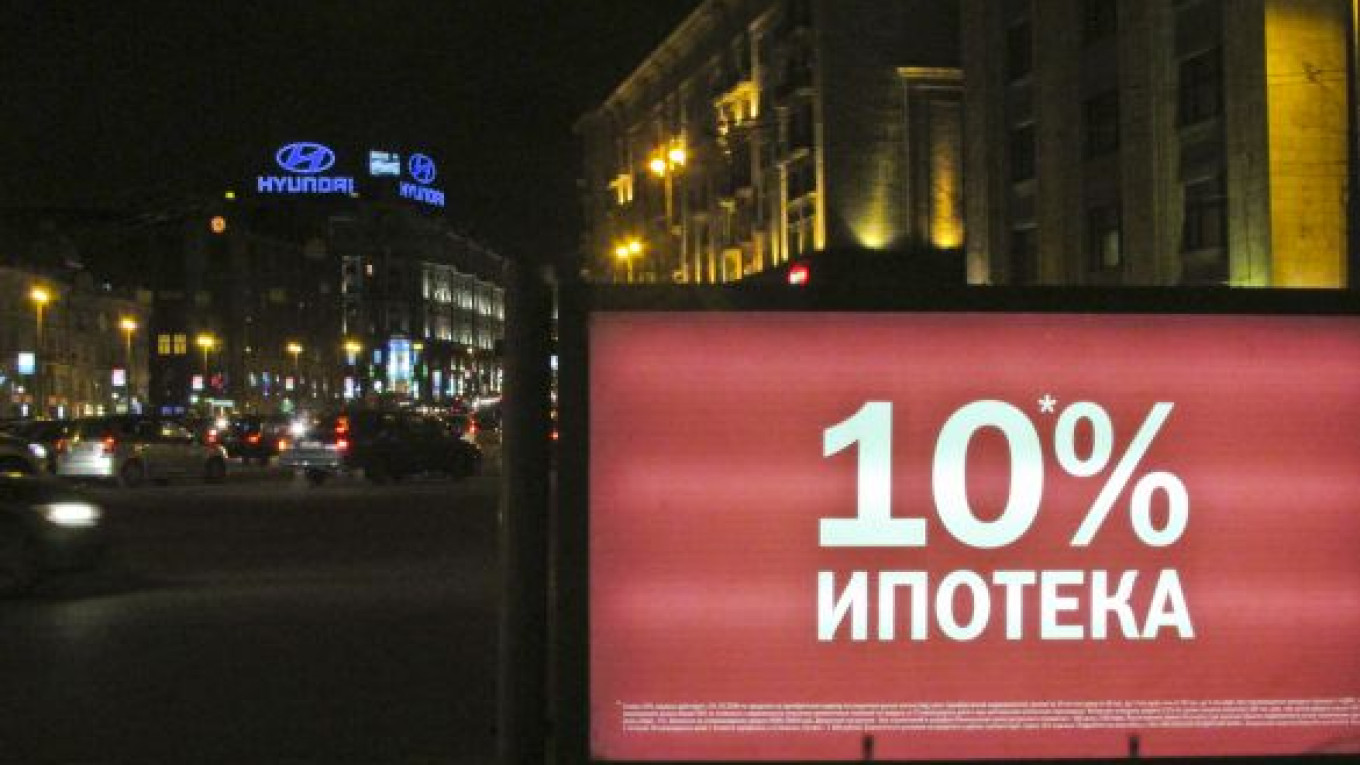President Dmitry Medvedev’s attempt to boost home purchases is leading Sberbank to plan its debut mortgage-backed bonds while the government’s housing agency prepares its first issue in two years.
The Agency for Mortgage Lending may sell home loan-backed securities in September, said Denis Grishukhin, head of structured products at AIZhK. Sberbank is preparing its sale for 2012, Natalia Karaseva, the bank's head of consumer lending, said in a July 2 e-mail.
While Medvedev began an initiative to increase home ownership in 2008, loan rates average 13.8 percent, more than twice the level of inflation and above the Central Bank’s 7.75 percent benchmark refinancing rate, the Central Bank says. Lenders may struggle to find investors for mortgage bonds after losses on the securities from the U.S. subprime crisis, according to Commerzbank and UralSib.
“The plans might be more to please the government rather than them seeing real demand on the market,” said Marina Vlasenko, a credit analyst at Commerzbank, Germany’s second-largest lender. “For these mortgage-linked bonds, the market still has no appetite.”
The housing agency will offer 6 billion rubles ($192.8 million) of the bonds in September and expects the notes to have the same debt ratings as government securities, Grishukhin said. Russia is rated Baa1 by Moody’s Investors Service and BBB at Standard & Poor’s. ?
Prime Minister Vladimir Putin said in February that mortgage rates remain too high and the government will spend 250 billion rubles this year to lower costs. As part of the plan, the government let Vneshekonombank buy mortgage-backed securities with part of the pension assets it manages to help stimulate the market.
Outstanding mortgage-backed securities have mostly traded at distressed levels since the collapse of the U.S. subprime market, said Ian McCall, who helps oversee about $500 million of emerging-market debt as a director at Argo Capital in London.
Those backed by loans made in 2008 or earlier trade too infrequently to show reliable prices, according to Argo and UralSib. Distressed debt yields at least 10 percentage points, or 1,000 basis points, above similar-maturity Treasury notes.
“After the subprime crisis in the U.S., the risk premium on such bonds must be larger,” said Dmitry Dudkin, a fixed-income analyst at UralSib. “Even before the crisis, they were not very popular.” ?
AIZhK will “ensure investors’ interest” by reducing the maturity on new mortgage debt to about 2 1/2 years, Grishukhin said in a July 3 e-mail. The last bonds it sold in 2007 and 2008 mature in 2039, 2040 and 2041, Bloomberg data show.
Sberbank said last week that it plans to make home loans “more affordable” by cutting the down payment required and boosting the size of the maximum mortgage loan it extends by as much as 10 percent from the start of this month.
Investors demand a higher yield to buy Russian government debt than bonds of Mexico, which have similar credit ratings, and Brazil, ranked two steps lower at Baa3 by Moody’s. The extra yield over U.S. Treasuries on Russian government debt included in JPMorgan Chase & Co.’s EMBI+ Index fell 2 basis points on July 2 to 282, compared with a spread of 179 for Mexico and 243 for Brazil. ?
Russia credit-default swaps cost 4 basis points more than similar contracts for Turkey, which is rated four levels lower at Ba2 by Moody’s. The gap has narrowed from 40 basis points on April 20. Russia credit-default swaps rose 7 basis points to 202 on July 1, the highest level since June 8. The contracts, which investors use to hedge against losses on debt or speculate on creditworthiness, pay the buyer face value if a borrower reneges on its obligations.
Russian lenders have issued at least 62 billion rubles of mortgage-backed bonds since May 2007, according to Bloomberg data. The banks have provided 83.7 billion rubles of home loans since the start of the year, Central Bank data show. New mortgages may reach 280 billion to 320 billion rubles this year, AIZhK said in an e-mailed report on June 23.
The consumer banking unit of state-run VTB Group, the country’s second-biggest lender, raised 15 billion rubles in December in the largest offering of Russian mortgage bonds. The VTB-24 securities are puttable in December 2011, when holders can force the bank to redeem them. The price has climbed to 104.7 percent of face value from 100 percent at the time of the sale, reducing the yield to 6.43 percent, compared with 6.55 percent on VTB-24’s ruble bonds due October 2011.
Most of the mortgage bonds investors are willing to buy come from government-linked institutions, said Paul Biszko, an emerging market strategist at Royal Bank of Canada.
The Russian housing debt market is “really unknown” to investors, Biszko said in a phone interview. “In this credit environment, I don’t see strong appetite for that kind of paper.”
A Message from The Moscow Times:
Dear readers,
We are facing unprecedented challenges. Russia's Prosecutor General's Office has designated The Moscow Times as an "undesirable" organization, criminalizing our work and putting our staff at risk of prosecution. This follows our earlier unjust labeling as a "foreign agent."
These actions are direct attempts to silence independent journalism in Russia. The authorities claim our work "discredits the decisions of the Russian leadership." We see things differently: we strive to provide accurate, unbiased reporting on Russia.
We, the journalists of The Moscow Times, refuse to be silenced. But to continue our work, we need your help.
Your support, no matter how small, makes a world of difference. If you can, please support us monthly starting from just $2. It's quick to set up, and every contribution makes a significant impact.
By supporting The Moscow Times, you're defending open, independent journalism in the face of repression. Thank you for standing with us.
Remind me later.


